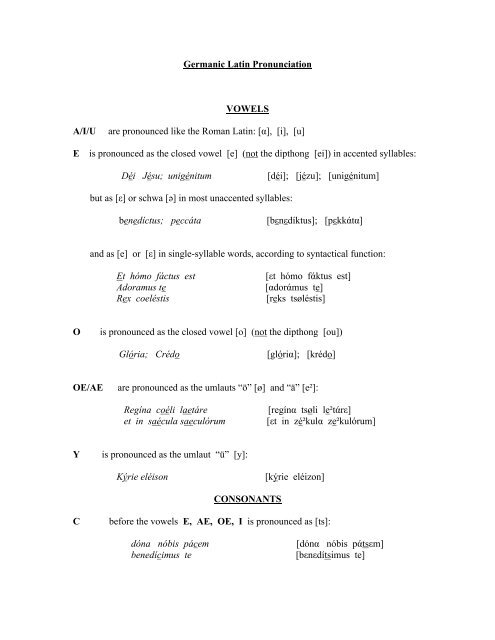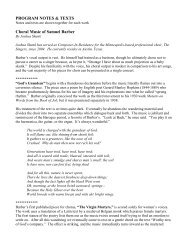Germanic Latin Pronunciation VOWELS A/I/U are ... - Conspirare
Germanic Latin Pronunciation VOWELS A/I/U are ... - Conspirare
Germanic Latin Pronunciation VOWELS A/I/U are ... - Conspirare
Create successful ePaper yourself
Turn your PDF publications into a flip-book with our unique Google optimized e-Paper software.
<strong>Germanic</strong> <strong>Latin</strong> <strong>Pronunciation</strong><br />
<strong>VOWELS</strong><br />
A/I/U<br />
<strong>are</strong> pronounced like the Roman <strong>Latin</strong>: [α], [i], [u]<br />
E is pronounced as the closed vowel [e] (not the dipthong [ei]) in accented syllables:<br />
Déi Jésu; unigénitum<br />
[déi]; [jézu]; [unigénitum]<br />
but as [ε] or schwa [əә] in most unaccented syllables:<br />
benedíctus; peccáta<br />
[bεnεdíktus]; [pεkkάtα]<br />
and as [e] or [ε] in single-syllable words, according to syntactical function:<br />
Et hόmo fáctus est<br />
Adoramus te<br />
Rex coeléstis<br />
[εt hόmo fάktus est]<br />
[αdorάmus te]<br />
[reks tsøléstis]<br />
O<br />
is pronounced as the closed vowel [o] (not the dipthong [ou])<br />
Glόria; Crédo<br />
[glόriα]; [krédo]<br />
OE/AE<br />
<strong>are</strong> pronounced as the umlauts “ö” [ø] and “ä” [e²]:<br />
Regína coéli laetáre<br />
et in saécula saeculόrum<br />
[regínα tsøli le²tάrε]<br />
[εt in zé²kulα ze²kulόrum]<br />
Y<br />
is pronounced as the umlaut “ü” [y]:<br />
Kýrie eléison<br />
[kýrie eléizon]<br />
CONSONANTS<br />
C<br />
before the vowels E, AE, OE, I is pronounced as [ts]:<br />
dόna nόbis pácem<br />
benedícimus te<br />
[dόnα nόbis pάtsεm]<br />
[bεnεdítsimus te]
G<br />
is always hard [g], as in the word get:<br />
Magníficat anima méa<br />
Grátias ágimus tibi<br />
Ágnus Déi<br />
Ex María Vírgine<br />
[mαgnífikαt άnimα méα]<br />
[grάtiαs άgimus tíbi]<br />
[άgnus déi]<br />
[εks mαríα vírginε]<br />
H<br />
is pronounced:<br />
hόmo; homínibus<br />
[hόmo]; [homínibus]<br />
QU is pronounced as [kv] :<br />
Quόniam tu sόlus sánctus<br />
Qui tόllis; qui sédes<br />
[kvόniαm tu zόlus zάηtus]<br />
[kvi tόllis]; [kvi zédεs]<br />
S<br />
is pronounced as [z] before vowels, but as [s] before consonants and in final<br />
position:<br />
Sánctus Dόminus Déus Sábaoth<br />
Et in spíritum sanctum<br />
in ecclésiam; únum baptísma<br />
cum sáncto spíritu<br />
Jesum Christum<br />
[zάηtus dόminus déus zάbαot]<br />
[εt in spíritum zάηtum]<br />
[in εkkléziαm]; [únum bαptísmα]<br />
[kum zάηto spíritu]<br />
[jézum krístum]<br />
T is pronounced hard [t], even before “i” ([ti], not [tsi]) :<br />
con substantiálem<br />
Pόntio Piláto<br />
deprecatiόnem; étiam<br />
Grátias ágimus tíbi<br />
[kon zubstαntiάlεm]<br />
[pόntio pilάto]<br />
[dεprεkαtiόnεm]; [étiαm]<br />
[grάtiαs άgimus tíbi]<br />
X<br />
is pronounced [kz] when followed by a vowel and as [ks] when followed by a<br />
consonant or in final position:<br />
Díxit María<br />
Exultáte Déo<br />
láudat exércitus<br />
Júste júdex ultiόnis<br />
[díkzit mαríα]<br />
[ekzultάtε déo]<br />
[lάudαt εkzértsitus]<br />
[jústε júdεks ultiόnis]<br />
XC is pronounced [ksk] before O, A, or U ; but before E it becomes [ktz] :<br />
Osánna in excélsis<br />
[ozάnnα in εktzélzis]
















